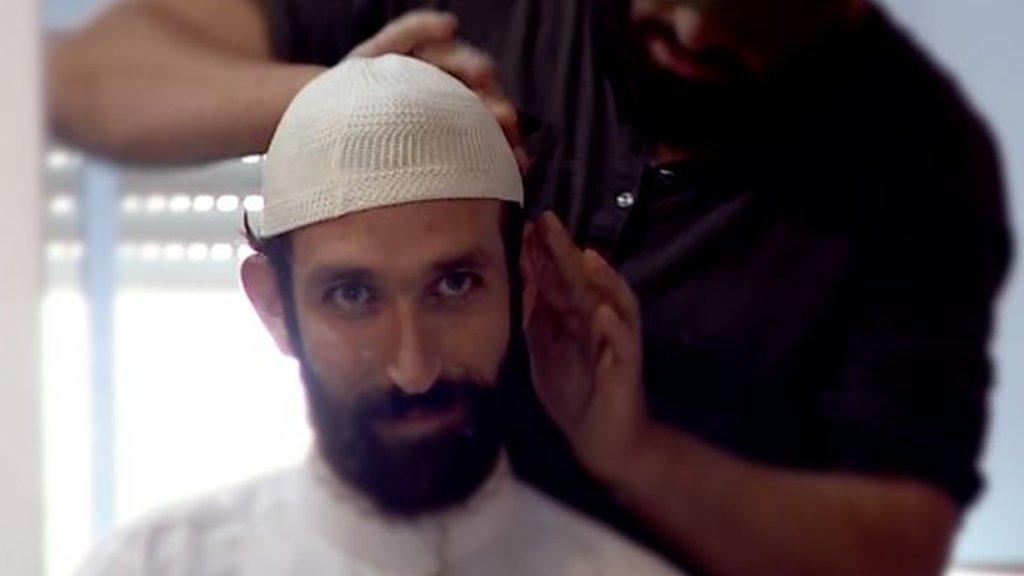Jerusalem on edge as festivals fall amid tensions
- Published
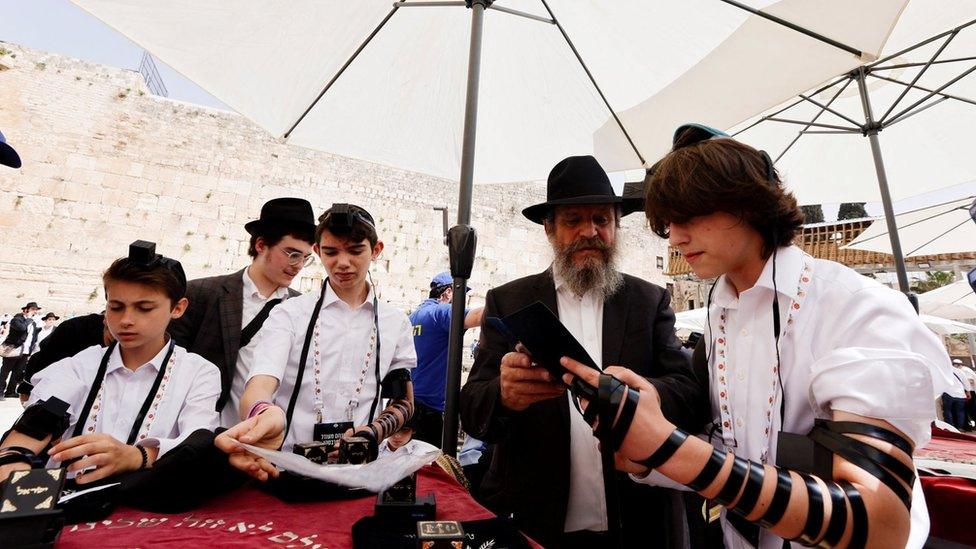
The Western Wall is a remnant of the retaining wall of the compound that contained two biblical Jewish temples
The last time Ramadan for Muslims, Passover for Jews and Easter for Christians all happened at the same time was three decades ago.
This week, the overlapping religious holidays promise to bring tens of thousands of Israeli and Palestinian worshippers, as well as foreign pilgrims, to Jerusalem's Old City.
But they have also increased tensions around contested sacred sites. There are visibly many more Israeli police officers in occupied East Jerusalem, and they are on high alert after the deadliest series of attacks in Israel in years.
"For us as Muslims, it is essential to pray at al-Aqsa Mosque during Ramadan. It's a spiritual time and I always look forward to it," says Ziad, who carries a prayer mat over his shoulder as he heads to the third holiest site in Islam.
"But this year, I will not bring my grandchildren to sit in the compound," confesses the clerk, who is sticking to the daily dawn-to-dusk fast required during Ramadan. "I'm a little afraid."
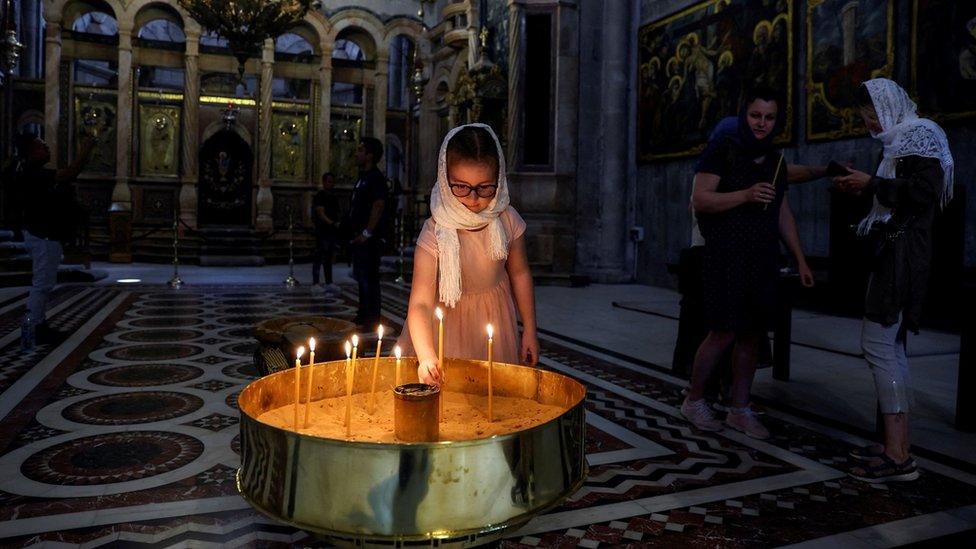
The Church of the Holy Sepulchre contains the tomb where Christians believe Jesus was buried
A Christian tour operator from East Jerusalem, Dalia Habash, says police roadblocks always make it difficult for her to visit elderly relatives in the Old City for Easter and yet she is compelled to go.
"Being a Palestinian Christian, celebrating in Jerusalem is special. Not only is it the place where Jesus was crucified, buried and resurrected, it's also being around other Christians and Palestinians celebrating together," she comments.


She describes her joy at singing and marching with scouts carrying palm fronds from the Mount of Olives on Palm Sunday and during the Orthodox ritual of Sabt al-Nur (Saturday of Light) at the Church of the Holy Sepulchre.
"Within seconds of the bells ringing out and the cry, 'He has risen,' there are candles being lit all over the Old City," Dalia says.
"There is nothing like it in all the world."
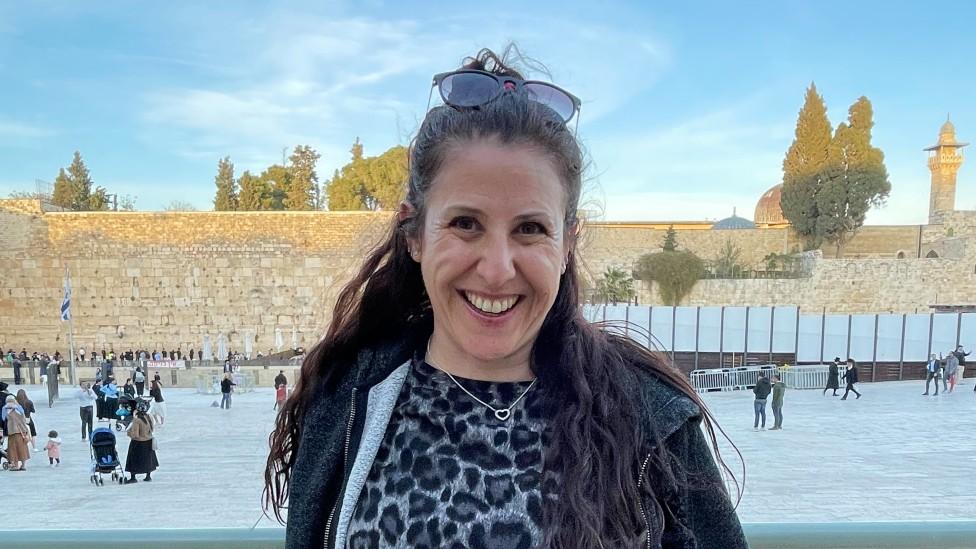
Keren Troyner says she "loves the sense of unity" at the Western Wall
Over at the Western Wall, the holiest place where Jews are permitted to pray, being in Jerusalem has a deep resonance for Passover.
At the ritual seder meal, there is a retelling of the Exodus story of the liberation of the Israelites from slavery in ancient Egypt. Traditionally, the very last words are "Next year in Jerusalem", reflecting a wish for Jews to return to their biblical homeland.
"It's a spiritual place. I believe if I come here, my prayers will be answered," says Keren Troyner, who now lives in Canada, but was born in Israel. "I love the sense of unity, to see people around me crying and pouring out their souls."
"The security situation isn't in the forefront of my mind," Keren goes on. "I don't walk around in fear. You can only have faith that God will protect you."
Ronit, an Israeli soldier, is looking forward to celebrating Passover with her family, but she has a strong awareness of what she sees as "the uncertainty" of this time.
"I'm worried about the security situation, but I trust our security services," she says.

Al-Aqsa Mosque and the Dome of Rock are located on the Haram al-Sharif/Temple Mount compound
Israeli-Palestinian violence has previously erupted when holidays coincide and nationalist Jews want to visit the Temple Mount/Haram al-Sharif compound, where the al-Aqsa mosque is located. Jews revere the compound as the location of two biblical temples and it is the holiest site in Judaism.
Last May, Hamas, the Islamist group which governs the Gaza Strip, fired rockets towards Jerusalem following clashes at al-Aqsa Mosque, setting off a devastating 11-day war.
In recent weeks, there have been high-level meetings between Israeli and Palestinian officials to try to ensure calm and freedom of worship ahead of this year's feasts for the three Abrahamic faiths.
Tour guide Shraga Ben Yosef provides a quick trip around Jerusalem's holiest sites
These even involved King Abdullah of Jordan, whose ruling family has been the custodian of Islamic and Christian holy sites in Jerusalem for nearly 100 years.
However, their agreements were unable to stop four shocking attacks in Israel over the past three weeks, which killed 14 people.
Two were carried out by Israeli Arab citizens and were linked to the Islamic State (IS) group. The other two were shootings by Palestinian gunmen from the Jenin area of the occupied West Bank. All of their deadly actions were praised by Hamas and other militant groups.
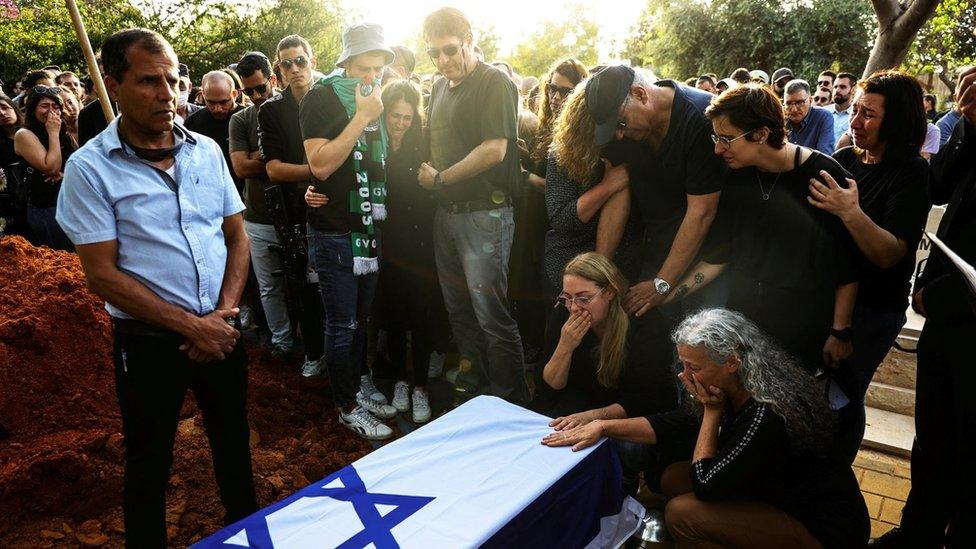
The three Israeli victims of last week's shooting attack in Tel Aviv were buried on Sunday
"I'm not afraid to say it publicly: 'We don't want another war,'" says Nevin Saleh, a mother of four, as she nervously watches events unfold from Gaza.
She describes how she and her family have just rebuilt their home after it was damaged by an Israeli air strike 10 months ago.
"We decorated the house to welcome Ramadan," she says. "Every day, my daughters ask if we are going to celebrate Eid al-Fitr [the festival marking the end of the holy month]. Last year, I bought them new clothes, but, unfortunately, they never got to wear them."
This week, an Israeli military official told journalists: "We wish to see this time of holidays go past in a safe, secure way," adding that the situation was "complicated".
He said security forces were trying to balance civilian measures, such as allowing Palestinians with permits to enter Jerusalem to pray, with counter-terrorism operations.

A Palestinian teenager was killed in clashes with Israeli soldiers near Bethlehem on Wednesday
The Israeli army has stepped up raids and arrests across the West Bank, leading to serious clashes. At least 20 Palestinians - including attackers and those said to have been planning attacks - have been killed in the latest wave of violence.
In Jenin, which has been a main focus of Israeli soldiers' actions, anger is rising.
"Yes, the situation is bad, especially in the month of Ramadan, but we will be united against daily incursions and cold-blooded executions," says Jihad al-Zohri defiantly. "If it's imposed on us, we will fight with honour and die with dignity."
For many Palestinians and Israelis, as so often in the past, the happiness of religious celebrations is undercut by reminders of their continuing conflict.
Additional reporting by Rushdi Abualouf in Gaza
- Published8 February 2022
